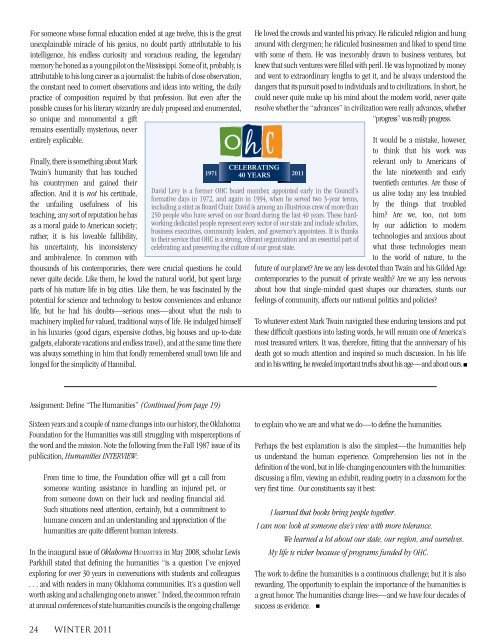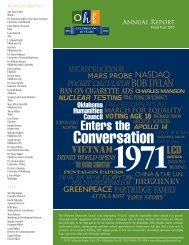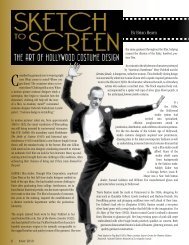Oklahoma Humanities magazine - Oklahoma Humanities Council
Oklahoma Humanities magazine - Oklahoma Humanities Council
Oklahoma Humanities magazine - Oklahoma Humanities Council
You also want an ePaper? Increase the reach of your titles
YUMPU automatically turns print PDFs into web optimized ePapers that Google loves.
For someone whose formal education ended at age twelve, this is the greatunexplainable miracle of his genius, no doubt partly attributable to hisintelligence, his endless curiosity and voracious reading, the legendarymemory he honed as a young pilot on the Mississippi. Some of it, probably, isattributable to his long career as a journalist: the habits of close observation,the constant need to convert observations and ideas into writing, the dailypractice of composition required by that profession. But even after thepossible causes for his literary wizardry are duly proposed and enumerated,so unique and monumental a giftremains essentially mysterious, neverentirely explicable.Finally, there is something about MarkTwain’s humanity that has touchedhis countrymen and gained theiraffection. And it is not his certitude,the unfailing usefulness of histeaching, any sort of reputation he hasas a moral guide to American society;rather, it is his loveable fallibility,his uncertainty, his inconsistencyand ambivalence. In common withthousands of his contemporaries, there were crucial questions he couldnever quite decide. Like them, he loved the natural world, but spent largeparts of his mature life in big cities. Like them, he was fascinated by thepotential for science and technology to bestow conveniences and enhancelife, but he had his doubts—serious ones—about what the rush tomachinery implied for valued, traditional ways of life. He indulged himselfin his luxuries (good cigars, expensive clothes, big houses and up-to-dategadgets, elaborate vacations and endless travel), and at the same time therewas always something in him that fondly remembered small town life andlonged for the simplicity of Hannibal.He loved the crowds and wanted his privacy. He ridiculed religion and hungaround with clergymen; he ridiculed businessmen and liked to spend timewith some of them. He was inexorably drawn to business ventures, butknew that such ventures were filled with peril. He was hypnotized by moneyand went to extraordinary lengths to get it, and he always understood thedangers that its pursuit posed to individuals and to civilizations. In short, hecould never quite make up his mind about the modern world, never quiteresolve whether the “advances” in civilization were really advances, whether“progress” was really progress.It would be a mistake, however,to think that his work wasrelevant only to Americans ofthe late nineteenth and earlytwentieth centuries. Are those ofus alive today any less troubledby the things that troubledhim? Are we, too, not tornby our addiction to moderntechnologies and anxious aboutwhat those technologies meanto the world of nature, to thefuture of our planet? Are we any less devoted than Twain and his Gilded Agecontemporaries to the pursuit of private wealth? Are we any less nervousabout how that single-minded quest shapes our characters, stunts ourfeelings of community, affects our national politics and policies?David Levy is a former OHC board member, appointed early in the <strong>Council</strong>’sformative days in 1972, and again in 1994, when he served two 3-year terms,including a stint as Board Chair. David is among an illustrious crew of more than250 people who have served on our Board during the last 40 years. These hardworkingdedicated people represent every sector of our state and include scholars,business executives, community leaders, and governor’s appointees. It is thanksto their service that OHC is a strong, vibrant organization and an essential part ofcelebrating and preserving the culture of our great state.To whatever extent Mark Twain navigated these enduring tensions and putthese difficult questions into lasting words, he will remain one of America’smost treasured writers. It was, therefore, fitting that the anniversary of hisdeath got so much attention and inspired so much discussion. In his lifeand in his writing, he revealed important truths about his age—and about ours.Assignment: Define “The <strong>Humanities</strong>” (Continued from page 19)Sixteen years and a couple of name changes into our history, the <strong>Oklahoma</strong>Foundation for the <strong>Humanities</strong> was still struggling with misperceptions ofthe word and the mission. Note the following from the Fall 1987 issue of itspublication, <strong>Humanities</strong> INTERVIEW:From time to time, the Foundation office will get a call fromsomeone wanting assistance in handling an injured pet, orfrom someone down on their luck and needing financial aid.Such situations need attention, certainly, but a commitment tohumane concern and an understanding and appreciation of thehumanities are quite different human interests.In the inaugural issue of <strong>Oklahoma</strong> <strong>Humanities</strong> in May 2008, scholar LewisParkhill stated that defining the humanities “is a question I’ve enjoyedexploring for over 30 years in conversations with students and colleagues. . . and with readers in many <strong>Oklahoma</strong> communities. It’s a question wellworth asking and a challenging one to answer.” Indeed, the common refrainat annual conferences of state humanities councils is the ongoing challengeto explain who we are and what we do—to define the humanities.Perhaps the best explanation is also the simplest—the humanities helpus understand the human experience. Comprehension lies not in thedefinition of the word, but in life-changing encounters with the humanities:discussing a film, viewing an exhibit, reading poetry in a classroom for thevery first time. Our constituents say it best:I learned that books bring people together.I can now look at someone else’s view with more tolerance.We learned a lot about our state, our region, and ourselves.My life is richer because of programs funded by OHC.The work to define the humanities is a continuous challenge; but it is alsorewarding. The opportunity to explain the importance of the humanities isa great honor. The humanities change lives—and we have four decades ofsuccess as evidence.24 WINTER 2011







